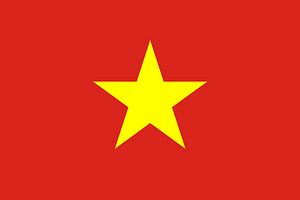Since the establishment of the People’s Republic of China, Vietnam-China relations have gone through roughly four major phases.
The first phase, which ran from 1949 to 1978, was characterized by ideological comradeship, mutual trust and support. China was a steady and indispensable source of support for the Democratic Republic of Vietnam (DRV) throughout both its war against the French, then against the United States and South Vietnam.
The second phase began with Vietnam’s invasion of Cambodia in 1978 and China’s border war with Vietnam in 1979, and ended in 1990. This period featured antagonism, war and mutual distrust.
The third phase began in 1991, with the restoration of diplomatic relations between the two countries through 2007. The first few years of this period saw a rapid improvement in bilateral relations based on ‘sixteen golden words’—friendly neighbours, total cooperation, stable and long-term, future-oriented increased trade and settlement of border disputes, mostly in favour of China. This spirit of cooperation and renewed friendship was, however, weakened toward the latter part of the period due to Vietnam’s concern over China’s rise and its aggressive behavior in the South China Sea.
The fourth phase, which began in 2008, pitched China’s increasing assertiveness against Vietnam’s efforts to preserve its sovereignty and territorial integrity in the face of the China challenge. The future of Vietnam-China relations depends on the interaction between two constants (geography and history) and two variables (China’s policy and changing big powers’ relationship).
Geographically, Vietnam is a small country living in the shadow of a huge neighbour. It’s normal for a big country to seek influence over a smaller neighbour, just as it’s normal for a small country to resist that effort to preserve its independence until they reach a mutually satisfactory accommodation. In the past, when the two countries shared the same ideological fervour and faced a common enemy—the anticommunist ‘imperialists’—relations were close and solid. The end of the Cold War, the collapse of European communism, the ascendancy of the market economy and the force of global integration have weakened the special ideological bond between China and Vietnam and have revived the perennial problem of the big neighbour-small neighbour relationship, as well as Vietnam’s strategic mistrust of China.
In 1990, feeling threatened by the radical transformation in the communist world, Vietnam sought a communist alliance with China against the threat of a perceived Western-instigated ‘peaceful evolution.’ China accepted Vietnam’s proposal for reconciliation, but rejected its request for an alliance. Failing to secure an alliance with China, Vietnam began to take serious steps to reorient Vietnam’s foreign policy toward its neighbouring countries and the West, and worked to improve its international profile. The success of this policy has resulted in the normalization of US-Vietnam relations, deepening Vietnam’s integration into the ASEAN system, and its election as a non-permanent member of the United Nations Security Council in 2008 and as the Chair of ASEAN in 2010.
If geography and history combine to make Vietnam’s mistrust of China an underlying factor in bilateral relations, Chinas’ actions since 2008 have further reinforced this. On the one hand, China accelerated its naval build up in the South China Sea, while Chinese web sites began to publish ‘invasion plans’ against Vietnam. On the other hand, China began to warn foreign oil companies against exploring for energy in area claimed by Vietnam while allowing them to explore in area disputed by Vietnam.
More recently, in 2009, China unilaterally imposed a fishing moratorium in the South China Sea, arrested Vietnamese fishermen and made public its claim over 80 percent of the South China Sea—a claim that seriously encroached upon Vietnam’s exclusive economic zone. Vietnam reacted by encouraging Vietnamese fishing vessels to continue fishing in disputed areas, purchasing arms to beef up its defences and, despite China’s protests, multilateralizing the South China Sea dispute and seeking the cooperation of other countries.
The US has made clear it doesn’t share China’s views over its excessive territorial claim, and that it opposes any attempt to intimidate US companies ‘engaging in legitimate economic activity’ and interference with the free navigation in the South China Sea. China’s aggressive behavior thus speeds up the process of US re-engagement in Asia, including with Vietnam. This new US determination emboldened countries including Vietnam to stand up to China, as reflected at the Shangri-La dialogue in June 2010, the Fifth East Asian Summit and the first ADMM-Plus in Hanoi in October 2010.
At the same time, US-Vietnam military relations have improved markedly, beginning with the first political-military dialogue in 2009 and followed by the first defence policy dialogue in 2010. China’s aggressive behavior in the South China Sea brought about a convergence of strategic interests between
Vietnam and the United States and served as a driving force behind Vietnam’s rapid rapprochement with America despite its fear of ‘peaceful evolution.’
All this said, Vietnam doesn’t want to antagonize China unnecessarily. Ideologically, it’s more comfortable with China than with the United States. Economically, China is a potential market, a source of financial assistance and a model of development. The biggest obstacle to good relations between the two countries is their conflicting claims over the South China Sea.
Vietnam has for its part declared that it won’t make further concessions to China’s excessive demands. A peaceful solution to this problem therefore depends heavily on China’s restraint and magnanimity. If it can’t respond as hoped, China will simply drive Vietnam and other countries further away—and into closer cooperation with the United States.
Hung Nguyen is an associate professor of government and international relations at George Mason University.

































